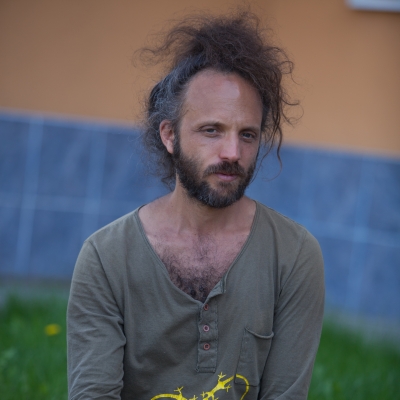Asaf Barach
Schedule
- 11/18: 10:20AM – 1:20PM: Workshop, Ark
- 11/19: 6:00-9:00PM: Workshop, Ark
- 11/20: Lecture, 4:00–5:00PM, Ark
Workshop - Weighting with the trouble: Moving-pondering with Donna Haraway and Brian Massumi
Donna Haraway writes that “staying with the trouble requires learning to be truly present, not as a vanishing pivot between awful or edenic pasts and apocalyptic or salvific futures, but as mortal critters entwined in myriad unfinished configurations of places, times, matters, meanings.” According to Brian Massumi: “Affective politics, understood as aesthetic politics, is dissensual, in the sense that it holds contrasting alternatives together without immediately demanding that one alternative eventuate and the others evaporate...The political question, then, is not how to find a resolution. It’s not how to impose a solution. It’s how to keep the intensity in what comes next.”
My movement improvisation (as) research, under the different guises of, ‘dancer’, ‘teacher’ , ‘somatic practitioner’, ‘performer’, ‘scientist’ among others, ponders the ex-comforting insights of Haraway and Massumi. The verb ponder comes from the latin pendere, ‘to weigh’. From my teachers Steve Paxton and Hubert Godard I have learned to appreciate the fundamental role gravity, and our ever-going negotiation with it, play in the making of who we are (as individuals, specie and living organisms). I am interested in the particular sense of weighting/waiting of the here/now (entangled, or folded with, the spatiotemporal construction we call ‘there’). This weighting/waiting (I like very much the french ‘attendre’ which suggests a kinesthetic stretching) can be approached variably as a specific quality of attention (vigilance), a specific tonic or postural dynamics or as an ethical/political stance (as in Klien’s Parliament). In my work, and the proposition for Duke, I am not trying to dis-entangle these different layers but instead (following Karen Barad) to diffractively co-articulate concepts/methods from the cognitive sciences, improvisation practice, somatics and philosophy in order to make trouble.
Lecture - Improvising Science: waiting for the un-waited for
What does it mean to improvise? What does it mean to do science?
For many people (and dictionaries) to improvise means something like “do or perform on the spur of the moment”. However, the latin origin of the word is in-provisus or unforseen. So rather than focus on the doing, improvisation invites us to attend to what is yet unexpected or unknown... In other words, as improvisers we ask how to wait for the un-waited for (French: attendre l’inattendu).
In my talk I will propose that this perspective on the practice of improvisation makes it not so different from the practice of science. This convergence offers insights into both practices that I will point to. However, certain differences make a difference… Building on Barad’s Agential realist framework I will propose that science-doing and improvisation differ as to marie of the apparatus the practitioners use to engage with the phenomenon. Together with Brian Massumi’s Aesthetic politics this difference in apparatus will provide an outline for an aesthetic theory of improvisation (and science making).
Bio
Asaf has been practicing contact improvisation (CI, a contemporary dance technique) as well as other types of improvisation techniques (Butoh, tuning score...) since 1994. He Studied in Tel Aviv, New York, Paris and Boston. Among his most influential professors are Steve Paxton, Kirsty Simson, Lisa Nelson and Min Tanaka. Since 2000, he has taught in Europe, in the USA, in Buenos Aires and in Israel. In 2012, he organized an international conference in Paris around CI and ‘mindfulness’ (http://mindthepoint.wordpress.com/). He is the co-founder of the ME-lieu performance collective (2015-2016). Since 2016 he is a certified Rolfing® practitioner, a student of Hubert Godard. Asaf has been co-leading with Matthieu Gaudeau, since 2013 of the bodylab and the F.A.R nomadic somatics school, a trans-somatic (Feldenkrais, Alexander, Rolfing and CI) experiential research group. Asaf is a practicing cognitive neuroscientist (PhD 2008, MIT) at the CNRS (Centre National de la Recherche Scientifique). His research topics include language (syntax, language comprehension…) and dance (performance, spectating, joint improvisation, new technologies, labodanse.org). He has organized a number of indisciplinary events around dance, improvisation and cognition bringing together scientists, movement practitioners, anthropologists and philosophers. He is a member for the new ArTec graduate program in the university Paris 8 where he is taking part in shaping the recherche-creation program.

